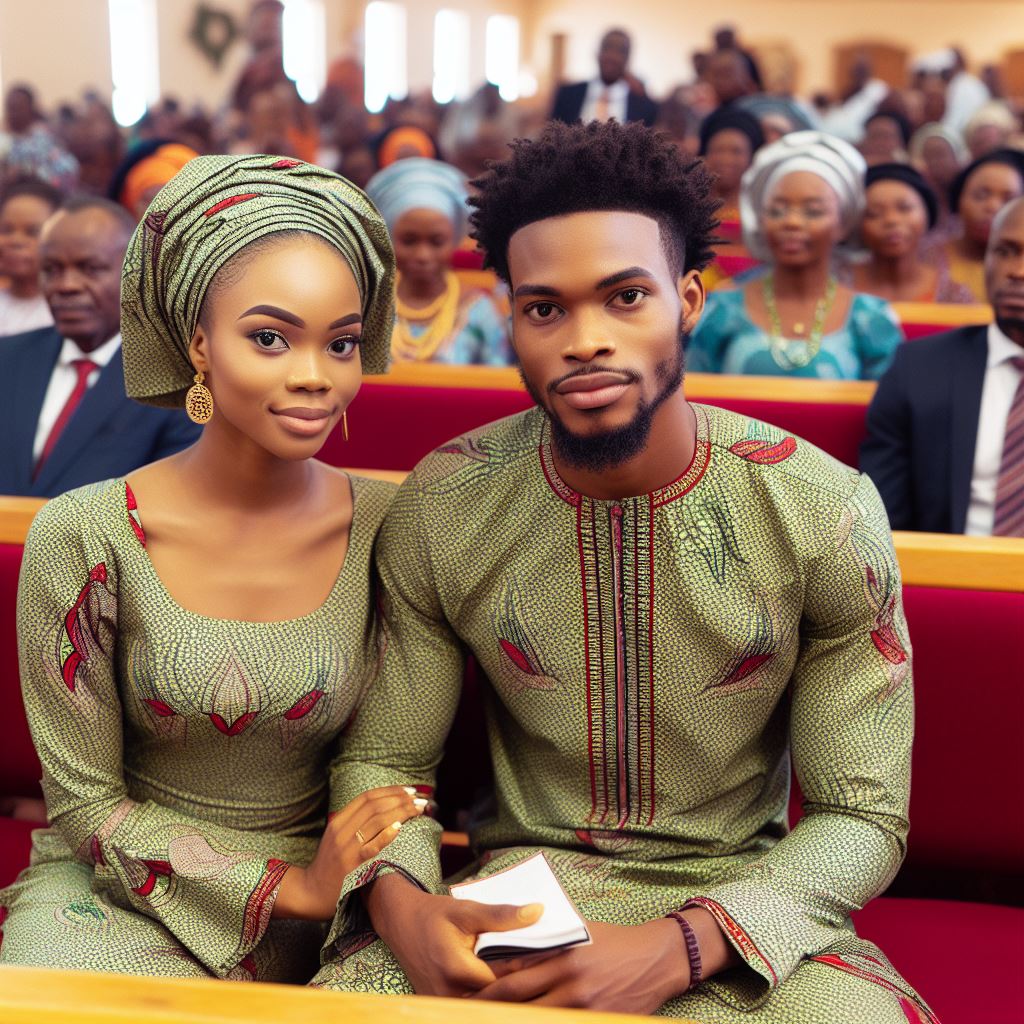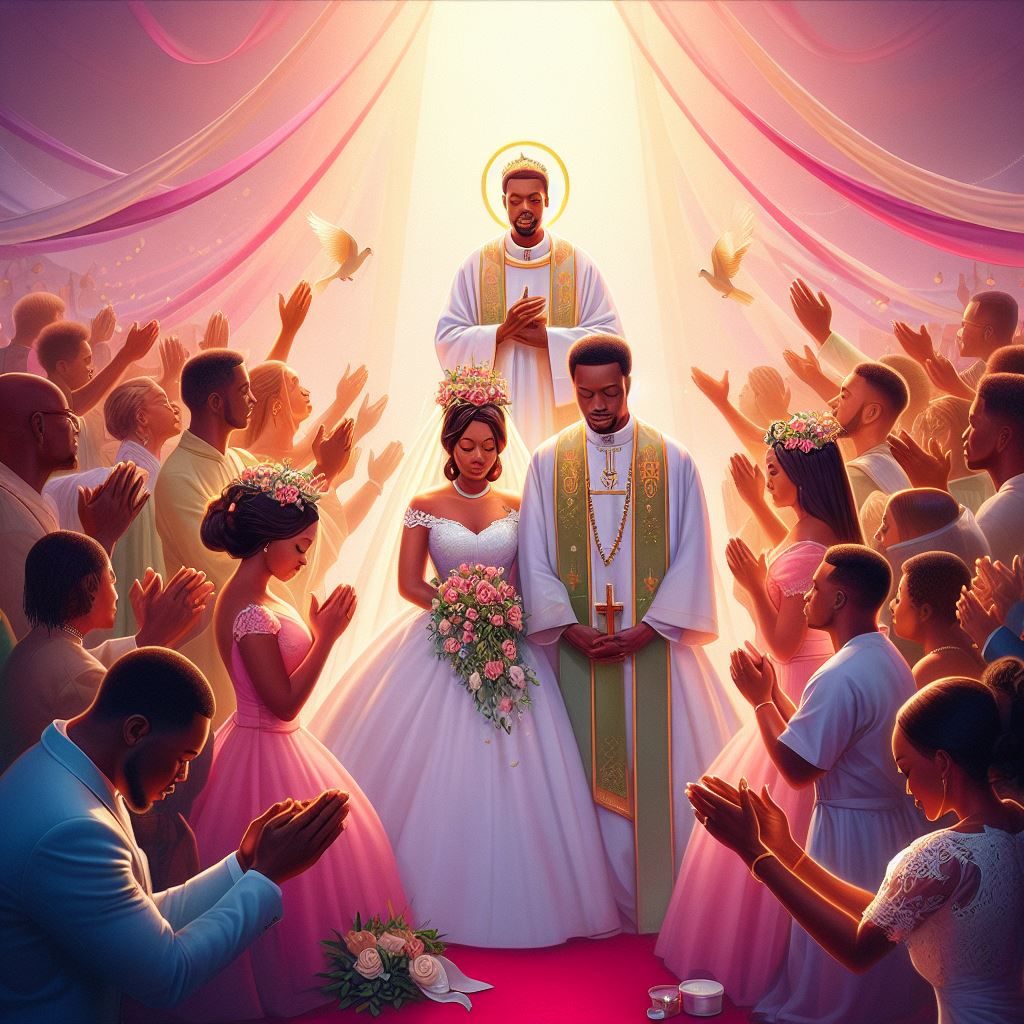Introduction
Background Information on Marriage in Nigeria
- Nigerian marriages are deeply rooted in cultural traditions, reflecting diverse ethnic practices and customs.
- Marriage is considered a sacred institution, symbolizing unity, family, and societal stability.
- Traditional ceremonies, vibrant attire, and communal celebrations characterize Nigerian weddings.
- Marriage in Nigeria is a significant life event, marking the transition to adulthood and family life.
Importance of Faith in Nigerian Culture and Society
- Faith is integral to Nigerian culture, shaping beliefs, values, and daily practices.
- Nigeria is religiously diverse, with Christianity, Islam, and indigenous religions playing vital roles.
- Faith influences moral codes, interpersonal relationships, and community bonds.
- Religious teachings guide marital roles, emphasizing love, respect, and mutual understanding.
- Faith-based principles offer solace during challenges, fostering resilience and unity within families.
- In this blog section, we explore how scriptures influence the dynamics of Nigerian marriages, promoting harmony and spiritual growth.
Role of Scriptures in Nigerian Marriages
Influence of religious beliefs on marriage practices
- Religious beliefs heavily influence the way marriages are conducted in Nigeria.
- Many Nigerians consider marriage as a sacred institution established and regulated by God.
- The religious teachings and doctrines shape the expectations and behavior of individuals in marriages.
- Marriage ceremonies often incorporate religious rituals and customs to seek divine blessings.
- Religious leaders play a crucial role in advising couples and ensuring adherence to scriptural principles.
Scriptures as a guide for marital roles and responsibilities
- Scriptures provide a framework for the roles and responsibilities of spouses in Nigerian marriages.
- For instance, the Bible teaches wives to submit to their husbands, and husbands to love their wives sacrificially.
- These teachings shape the dynamics of marital relationships and promote harmony and mutual respect.
- Religious scriptures also emphasize the importance of fidelity, trust, and commitment in marriage.
- These principles guide spouses in their actions and decisions, fostering a strong and enduring union.
Examples of specific scriptures and their impact on Nigerian homes
- Ephesians 5:22-33 instructs wives to submit to their husbands, and husbands to love their wives as Christ loved the Church.
- This scripture reinforces traditional gender roles in Nigerian marriages and emphasizes love and respect.
- Proverbs 31:10-31 describes the qualities of an excellent wife, encouraging women to be industrious and virtuous.
- Such teachings shape the expectations placed on women and influence their behavior in Nigerian households.
- 1 Corinthians 7:3-5 emphasizes the importance of sexual fulfillment and mutual consent in a marital relationship.
- This scripture encourages spouses to prioritize each other’s needs and fosters intimacy in Nigerian marriages.
Read: Inspirational Stories from Memorable Nigerian Weddings
Faith-based Institutions and Nigerian Marriages
The role of religious leaders in guiding marriages
Religious leaders play a significant role in providing guidance and counseling to married couples, promoting marital harmony.
They offer spiritual guidance, advice on conflict resolution, and emphasize the importance of commitment and fidelity.
Through pre-marital counseling, they help couples understand the responsibilities and challenges of married life.
Influence of religious teachings on marital counseling and support
Religious teachings form the foundation of marital counseling, providing principles and values for peaceful coexistence.
Scripture-based teachings on love, forgiveness, and selflessness inspire couples to overcome challenges, build trust, and maintain intimacy.
Additionally, religious institutions often provide support groups and marriage seminars to strengthen relationships.
Faith-based marriage ceremonies and rituals in Nigeria
Nigerian marriages are rich in cultural and religious rituals, reflecting the importance of faith in marital unions.
Traditional weddings are commonly conducted in accordance with religious customs, following specific rites and traditions.
The ceremonies involve prayers, blessings, exchange of vows, and participation in symbolic rituals to invoke divine blessings.
These faith-based rituals and ceremonies create a sacred atmosphere, underscoring the significance of marriage before God and the community.
They also serve as a reminder of the spiritual aspects of married life and the need for couples to seek divine guidance.
In review, faith-based institutions in Nigeria play a pivotal role in guiding and strengthening marriages.
Religious leaders provide valuable counseling, teaching couples how to navigate challenges and maintain healthy relationships.
The influence of religious teachings promotes love, forgiveness, and commitment, crucial elements in successful marriages.
Additionally, faith-based marriage ceremonies and rituals reinforce the significance of marriage, reminding couples of their spiritual journey together.
By embracing these religious principles and ceremonies, Nigerian homes can find solace and guidance in their faith, fostering lasting and fulfilling marriages.
Read: How to Prepare for a Halal Muslim Wedding in Nigeria

Challenges and Debates
Conflicting interpretations of scriptures in Nigerian marriages
The diverse interpretations of scriptures lead to disagreements among Nigerian couples.
Disputes arise when spouses have differing views on the roles and responsibilities dictated by scriptures.
Interpretation variations can cause religious tension, affecting the harmony within Nigerian homes.
Conflicting scriptural interpretations may contribute to misunderstandings regarding marital expectations and practices.
Different understandings of scriptures can challenge the unity and shared values within Nigerian marriages.
Continuity versus adaptation of traditional marriage practices with changing times
Traditional marriage practices may clash with the changing dynamics and demands of modern Nigerian society.
Some couples struggle to find a balance between preserving their cultural traditions and embracing modern values.
The clash between tradition and adaptation can create tension and conflicts within Nigerian households.
Negotiating between the desire to honor tradition and the need for flexibility can be challenging for couples.
The debate between continuity and adaptation of customs influences the dynamics of Nigerian marriages.
Controversial issues such as polygamy and gender roles based on religious teachings
Religious teachings on polygamy can incite disputes within families, leading to marital conflicts.
The societal stance on polygamy engenders disputes in Nigerian marriages.
Prescribed gender roles from religious teachings often sow seeds of inequality and power imbalances in matrimony.
Controversial topics like polygamy and religious-based gender roles act as stressors for Nigerian couples.
Nigerian households grapple with the challenge of reconciling traditional practices with modern values.
The interpretation of religious texts breeds misunderstandings regarding marital duties and obligations.
The clash between tradition and contemporary norms creates turmoil in many Nigerian homes.
This debate creates tension and conflict within Nigerian families, causing a rift between those who wish to preserve cultural traditions and those who desire adaptation to contemporary society.
Resolving these disputes is paramount for marital success in Nigeria.
It hinges on open, respectful communication, willingness to compromise, and harmonizing conflicting interpretations.
Couples must navigate the fine line between tradition and modernity while upholding mutual respect for each other’s values.
Societal norms and acceptance influence marital dynamics, shaping these debates.
Nigerian couples need to strike a harmonious balance between faith, scriptural teachings, and evolving societal values to guide their households effectively.
Read: Challenges in Marriages: Overcoming Hurdles Together
Gain More Insights: Marriage in Nigeria: Balancing Tradition and Change
Success Stories and Positive Impacts
Testimonies and experiences of couples who have relied on scriptures for guidance
Many Nigerian couples have shared their inspiring stories of how scriptures have guided their marriages.
They testify to the power of faith and the transformative impact it has had on their relationships.
By anchoring their marriages on biblical principles, they have experienced improved communication and conflict resolution.
Scriptures have provided them with a strong foundation, helping them navigate through challenges and strengthening their commitment.
Countless testimonies highlight the role of scriptures in fostering love, forgiveness, and selflessness among couples.
These stories serve as powerful reminders of the positive impact of incorporating faith into marital life.
Strengthening of family values and unity through faith-based approaches
Faith-based approaches rooted in scriptures have proven effective in strengthening family values and fostering unity.
Nigerian homes that prioritize scripture study and prayer observe an increased sense of togetherness.
Family members engage in faith-based activities that promote bonding and a shared spiritual journey.
Through regular family devotions, couples and children develop a deeper understanding of their faith and its teachings.
Scriptures serve as a moral compass, guiding families in making decisions aligned with their shared beliefs and values.
By incorporating scriptures into their daily lives, families cultivate an environment of love, mutual respect, and support.
Contributions to building healthier and more stable Nigerian homes
The influence of scriptures in Nigerian homes extends beyond individual relationships, contributing to the overall health and stability of families.
Marriages grounded in scriptures and faith experience lower rates of divorce and marital dissatisfaction.
The wisdom and guidance found in scriptures equip couples with the tools necessary to overcome challenges.
With the scriptures as a guide, Nigerian homes prioritize the well-being of each family member.
Children raised in such homes benefit from the positive atmosphere and witness firsthand the importance of faith in successful marriages.
This collective commitment to faith-based values has the potential to positively impact society as a whole.
Read: Arranged vs. Love: Navigating Marriage Choices in Nigeria
Discover More: Key Documents Needed for Marriage Registration in Nigeria
Gain More Insights: Proposal Mistakes to Avoid: Tips for Nigerian Grooms-to-Be
Conclusion
The significance of faith and scriptures in Nigerian marriages cannot be underestimated.
Couples rely on religious teachings to guide their marital journey.
There is ample potential for further research and exploration on the topic.
Scholars can delve deeper into the impact of scriptures on Nigerian homes.
It is highly encouraged for individuals to seek guidance from their religious beliefs in their marital journey.
Faith can provide a strong foundation for a successful and fulfilling marriage.




